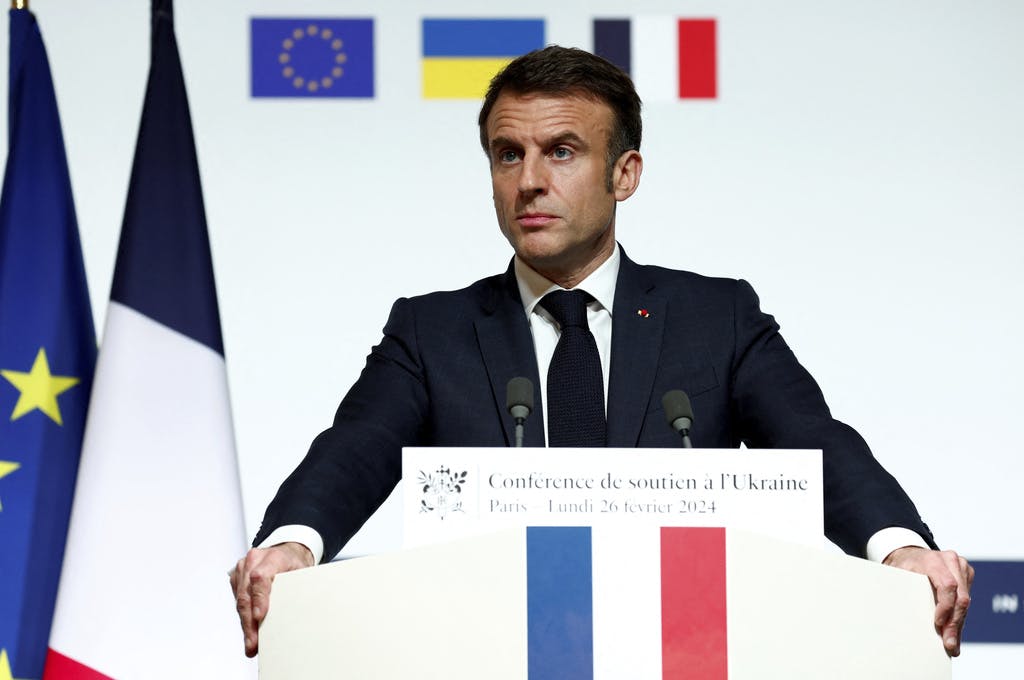Macron Le Warrior? In a Roundabout French Sort of Way, Peut-Être
All of sudden, the French president comes out swinging for more robust Western action to rout Russia from Ukraine — but le diable est dans les détails.

As surely as Americans are in love with Paris, there is no French president who does not love the limelight. Hence President Macron’s new foray into tough talk about the war in Ukraine. On Monday Mr. Macron said that sending Western ground troops to Ukraine “should not be ruled out.” What a reversal of rhetoric for the man who was once on the verge of placing on the bumper of the presidential Peugeot a sticker saying “Give Putin a Chance,”
Mr. Macron’s donning of the feathers of the haw appears to have rattled a cage or two at Moscow. On Wednesday, Reuters reported, the chairman of the State Duma weighed in, saying that “before making such statements,” Mr. Macron should “remember how it ended for Napoleon and his soldiers, more than 600,000 of whom were left lying in the damp earth.” That was a reference to the Grande Armée which invaded Russia in 1812, resulting in disaster.
The French president, whose Renaissance party is tumbling in the polls ahead of European parliamentary elections, got into his tough talking mode during a hastily convened parley of 20 European leaders in the French capital. What was meant as a show of European unity and force, though, really ended up showcasing the EU’s failures when it comes to supporting Ukraine. That could partly explain why President Zelensky was by midweek in Albania.
By convening an impromptu international rendezvous at Paris, and dishing out more robust language than usual pertaining to support for Ukraine, Mr. Macron might have been trying to flex some French muscle against the backdrop of somewhat weakening position from Germany — where, of course, Monday’s meeting did not take place. Unwittingly or not, the French president’s audaciousness put Chancellor Scholz on the backfoot yet again.
Herr Scholz publicly confirmed that, as Deutsche Welle reported, “British and French soldiers are actively engaged in the defense against Russia by programming target data for cruise missiles.” Whether or not those soldiers are in Ukraine or not is less clear, although some British special forces are likely there now. Also not clear what’s up with the small number members of the French Foreign Legion who might be inside Ukraine.
In any event, following Mr. Macron’s remarks, Germany and Poland declared that they would not be sending troops to Ukraine, and the NATO chief also publicly repudiated any such plans. French officials, for their part, were quick to clarify that only non-combatant roles would be under consideration in any case. Those roles could be fulfilled within the framework of the five priorities actually defined at the Paris parley.
Those priorities are de-mining, cyber defense, defense of Moldova, protection of the borders with Belarus, and the co-production of weapons in Ukraine. As for the latter element, Mr. Macron may be looking to burnish Paris’s role as a distribution point for supplying weaponry to Ukraine. Poland has benefitted the most from that position to date, but that is chiefly by dint of its proximity to Ukraine. France might want a bigger piece of that lucrative action.
Especially if America starts pivoting away from open-ended security assistance for Ukraine. France is an ally of America but a certain amount of rivalry between even the best of friends is par for course. France under Monsieur Macron’s uneven leadership— he is trailing Marine Le Pen in virtually every popularity poll — hasn’t always been on the mark with its Russia policy.
After all, the erstwhile young gun once suggested integrating Russia into Europe’s security framework. In terms of numbers published by the Kiel Institute, France has so far delivered under $700 million to Ukraine, whereas Germany has pumped in close to $20 billion. Another part of the French pivot — or the appearance of one — could be a realization that reasoning with President Putin is a lost cause.
Referring the Baltic states, Mr. Macron stated on Monday that “I was able to note, after listening to what most of the countries represented around the table said, that the common consensus was that we should be ready, in a few years, for Russia to attack these countries — the safety of all of us is at stake.” It is never too late to learn, n’est-ce pas? Even for a limelight-loving president like Monsieur Macron.

